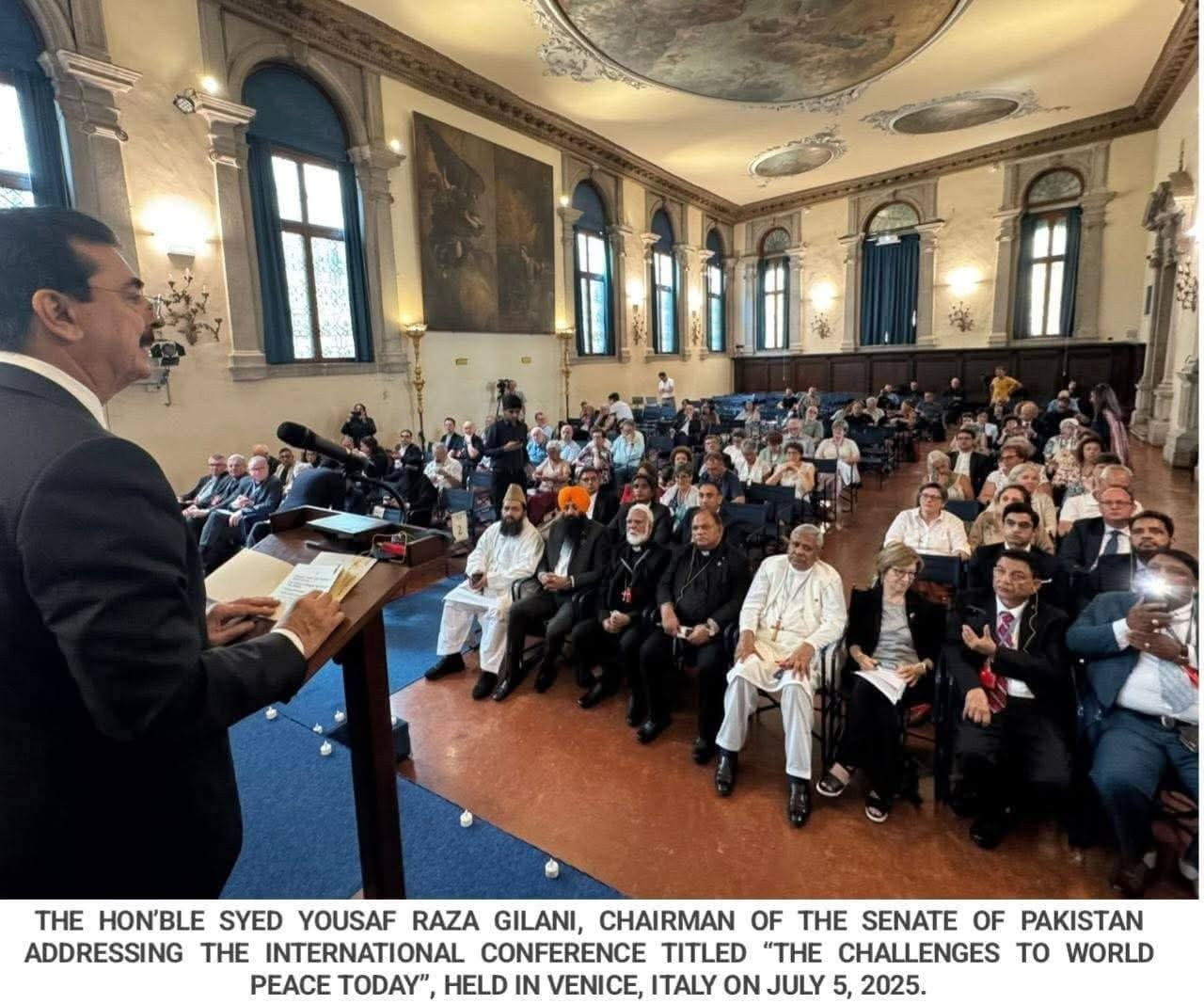News Desk
PR Venice, Italy:
In a comprehensive roundtable session of global faith based leaders titled “International Norms: Common Grounds for Preventing Conflicts”, held as part of the international conference “The Challenges to the World Peace Today.” The event gathered international dignitaries, church leaders, parliamentarians, and human rights advocates to focus on the urgent global need for safeguarding religious freedom and human dignity.
Prominent figures present included His Eminence Cardinal Joseph Coutts, Patriarch Francesco Moraglia, bishops from TV, Piacenza, and Vicenza, H.E. Bishop Samson Shukardin (President of the Catholic Bishops Conference of Pakistan), and Bishop Humphrey Peter of the Church of Pakistan, Peshawar Diocese. Civil and state authorities, along with federal and provincial ministers, also attended.
Dr. Mobeen began by extending gratitude to Dr. Paul Bhatti, Chairman of the All Pakistan Minorities Alliance and President of the Shahbaz Bhatti Mission, for the invitation to participate in the timely dialogue aimed at promoting freedom of conscience, religion, or belief.
Representing the Italian Roundtable on Religious Freedom and Belief—an initiative launched by Italian civil society and supported by the Pontifical Foundation Aid to the Church in Need-Italy, Community of St. Egidio, Pro-Terra Santa, International Foundation Oasis, AVSI, and the Association of Pakistani Christians in Italy—Dr. Mobeen reaffirmed the Roundtable’s commitment. The initiative is officially recognized by Dr. Davide Dionisi, Italy’s Special Envoy for Religious Freedom or Belief, and the Italian Ministry of Foreign Affairs and International Cooperation.
Dr. Mobeen emphasized that the Italian Roundtable actively engages with parliamentarians, diplomatic bodies, academia, and international organizations to champion religious freedom—especially for persecuted Christians. Quoting the Beatitudes from the Gospel of Matthew (5:10), he underscored the Christian message of hope and resilience, reminding them that “Blessed are those who are persecuted in the cause of uprightness: the kingdom of Heaven is theirs.” He further cited John 18:19-24 to emphasize the right to question unjust treatment.
Drawing on the 2022 biennial report by Aid to the Church in Need, Dr. Mobeen noted that 307 million Christians currently face persecution and strong discrimination globally, making Christianity the most persecuted religion.
He highlighted the universality of the Golden Rule—“Treat others as you wish to be treated”—as a foundational principle across religions, and stressed that national constitutions and penal codes must uphold this standard to protect human dignity and prevent the misuse of laws.
Referencing the 2025 report by UN Special Rapporteur on Freedom of Religion or Belief, Nazila Ghanea, Dr. Mobeen outlined the report’s findings on the intersection of religious freedom and the prohibition of torture. He also cited the Jubilee Campaign’s contributions that shed light on abuses in countries such as Algeria, China, Eritrea, Iran, North Korea, Pakistan, and Yemen. These reports call out state authorities and ideological groups responsible for systemic torture and mob violence driven by religious hatred and political motives.
Dr. Mobeen brought attention to the assassinations of Catholic Federal Minister Shahbaz Bhatti and Muslim Governor Salman Taseer as stark examples of state failure in protecting religious minorities. He noted that while Bhatti’s killers remain unpunished, Taseer’s assassin was executed and has since become a symbol of radical extremism—his shrine fostering a dangerous culture of hatred and terrorism.
He urged the United Nations and its member states to foster sustained engagement with both government officials and civil society organizations in affected countries. Many states lack Special Envoys for religious freedom, reflecting the low priority given to this fundamental right. Furthermore, he criticized educational systems that embed hatred in curricula, calling for reforms to include the history of religions, intercultural understanding, and interfaith dialogue to foster mutual respect and peace.
Dr. Mobeen expressed concern that the European Union’s Office for Religious Freedom outside Europe remains vacant, even after the formation of a new EU government. He stressed that this vacancy hinders progress on global religious rights initiatives.
Concluding his speech, Dr. Mobeen called the event a vital step in fostering collaboration between nations and churches. He emphasized that while no country is free of challenges, civil and religious leaders must take concrete measures to cultivate a culture rooted in dignity, coexistence, and socio-economic upliftment, said the presser.


